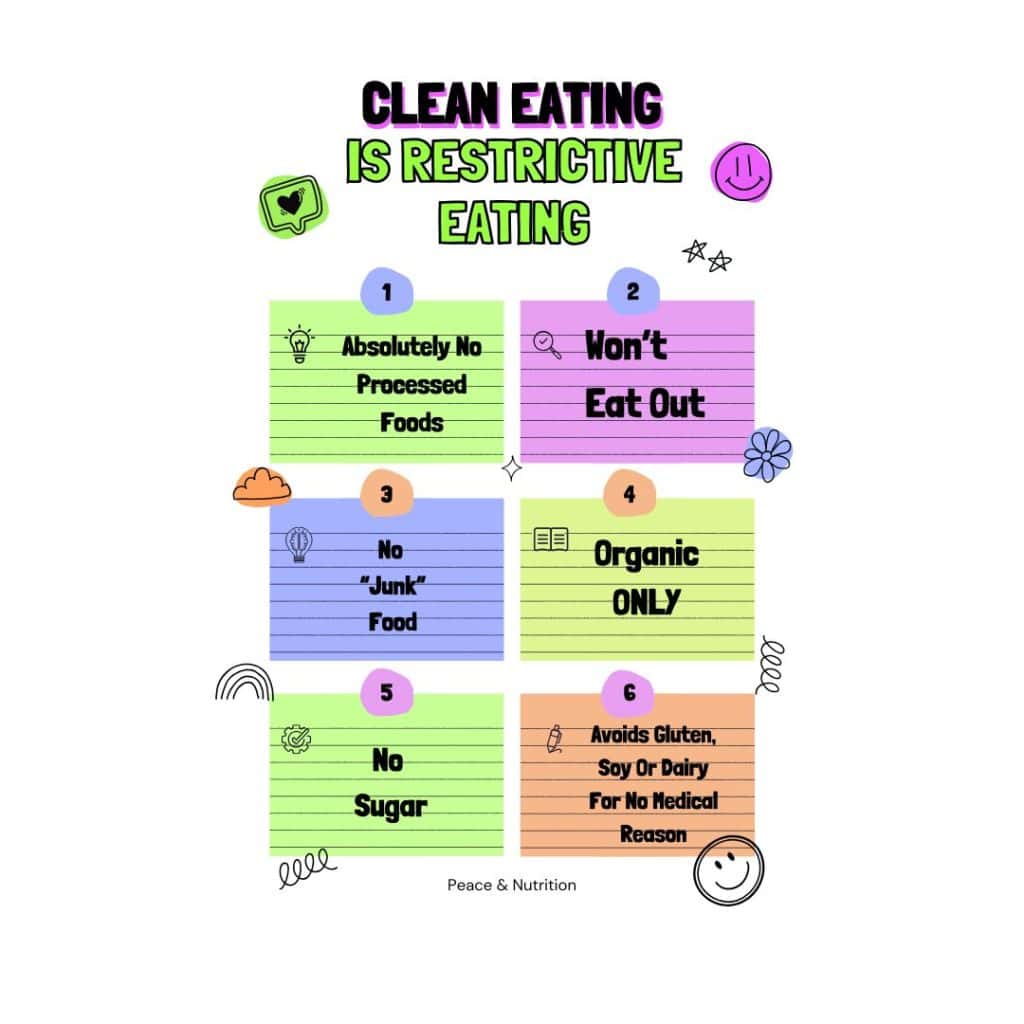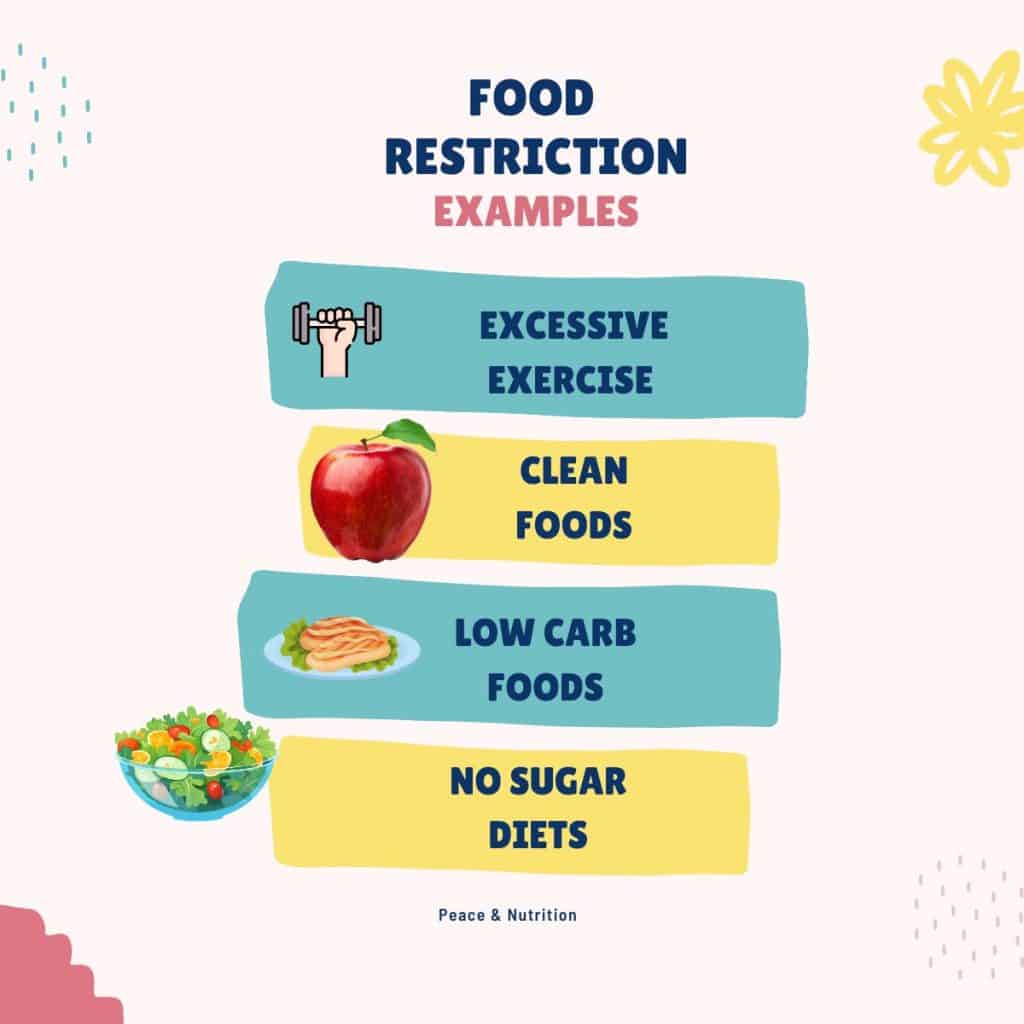Table of Contents
Last updated on August 12th, 2025 at 01:58 am
Food restriction refers to intentionally limiting the amount or type of food you eat, often in an effort to lose weight, “eat clean,” or follow strict dietary rules. While some people may view food restriction as a path to better health, it can actually lead to nutrient deficiencies, slowed metabolism, increased cravings, and a damaged relationship with food.
In many cases, restrictive eating patterns can contribute to disordered eating or eating disorders, making it harder to listen to your body’s hunger and fullness cues.
You might be restricting food if you are:
- Clean eating
- Counting calories
- Intermittent fasting
- Cutting out carbs
- Using diet pills
It is important to know that just because a food elimination trend is popular, does not mean it is not restrictive. Understanding the signs, risks, and long-term effects of food restriction is essential for creating a balanced, sustainable approach to eating that supports both physical and mental health.
This article explores some of the most common food restrictions, when food restriction becomes more problematic, and how to truly eat freely.
Why Do I Restrict My Food
From a young age, you are bombarded with rules about your body and what you eat that “less is best.” The media and diet culture are constantly telling you that you should shrink your body and take up less space.
You probably learned in health class or at the doctors office that if you just “eat less” or “eat better” your life will be better.
Some common contributors to food restriction include:
- Fear of gaining weight and fatphobia
- Thin privilege
- Food shaming
- Food Rules
- Binging and then restricting
- Feeling Fat
- Body dysmorphia
- Biased BMI standards
Food Restriction Examples
You might restrict your food physically which means you don’t keep certain foods in the house, you don’t eat over a certain calorie amount or you don’t eat certain food groups. You can also restrict your food mentally which means that you might eat certain off limits foods but constantly feel guilty after you do it. Another example of mental food restriction is telling yourself that you will “be better or go on your diet tomorrow.”
Restricting any type of hunger can cause you to eat more, spike your anxiety, and screw up your hunger and fullness cues.

Clean eating
Clean eating is a style of eating that focuses on choosing foods that are considered “whole,” “natural,” and minimally processed. In its simplest form, it emphasizes things like fresh fruits and vegetables, whole grains, lean proteins, nuts, seeds, and healthy fats while limiting added sugars, refined grains, and packaged or processed foods.
While it can start as a well-intentioned approach to nutrition, the term “clean” can be misleading because it implies that some foods are “dirty” or “bad.” This moral labeling of food can lead to guilt, anxiety, or overly restrictive eating patterns. Many foods that are not considered “clean” are also packed with vitamins, minerals, and macronutrients which can lead you to be malnourished if you restrict your food in this way.
If you are clean eating your food rules might include:
- I avoid processed foods
- I Only eating organic
- I don’t eat any GMO’s
- I never eat “junk” foods or keep them in the house

Cutting Carbs
Carbohydrates are the primary source of energy for our bodies and brains. Cutting carbs can not only make us crave carbohydrates intensely. Low carbohydrate intake will also leave you feeling sluggish, getting headaches, and unable to concentrate.
If you cut carbs you likely have food rules like:
- I don’t eat any bread, pasta or rice
- If I have a burger I don’t get a bun
- I only eat a certain number of carbs per day
- I do keto
- Carbs make you fat
Calorie Counting
Calorie counting can quickly turn into food restriction when awareness becomes a set of rigid rules that dictate what, when, and how much you “should” eat—regardless of hunger, fullness, or satisfaction. Any time you start implementing rules about calories you lose yourbodies natural ability to navigate hunger. Counting calories can make it so that we can’t stop thinking about food as a result of the restriction.
Your food rules resulting from calorie restriction might inclue:
- I only eat “X” amount calories for the day
- I swap out most of my calories for zero or negative calorie foods
- I only eat 400 calories per meal
- I only eat 500 calories a day from carbohydrates
Intermittent Fasting
intermittent fasting is a form of food restriction because it limits when you’re allowed to eat, often creating rigid eating windows and prolonged periods without food. Instead of eating based on natural hunger cues, you follow a set schedule—such as only eating during an 8-hour window or fasting for 16–24 hours at a time.
Food restriction around intermittent fasting might look like:
- I don’t start eating until a certain time (for example 12 p.m.)
- I stop eating after 5 p.m.
- I fast completely for a 24-hour time period once a week
- I Fasting after a cheat day

Excessive Exercise
Excessive exercise can be a form of food restriction because it’s often used as a way to compensate for eating, burn off calories, or “earn” food. Even though it’s not limiting food directly, the underlying intent is the same—controlling or reducing your body’s available energy by creating a large calorie deficit.
Some food rules around exercise can indlue:
- I don’t allow myself to eat until I run 4 miles
- If I eat a snack I have to burn that many calories in exercise
- I need to burn more calories than I eat in a day
- Intense workouts are a must
- I can’t miss my workout even if I feel sick or injured. No pain no gain.
Macronutrient Counting
Macronutrient counting is when you only allow a certain amount of your calories for the following macronutrient groups such as protein, fats or carbohydrates. You might also require yourself to get a certain amount of a macronutrient (for example protein) which can displace other nutrients and be a form of food restriction.
Macronutrient counting is restrictive because it does not allow our body to intuitively make food decisions. It also typically involves calorie counting which is also a form of food restriction.
Restricting your food through macro counting might look like:
- I must eat 120g of protein per day
- I can only eat 10g of carbs per meal
- I only eat fat free foods
- I must refuel after a work out with at least 40 grams of protein

Not Eating Sugar
Sugar is a carbohydrate, which is the body’s primary source of energy. While we can get carbohydrates in other forms that do not include simple sugars, restricting simple sugars will cause us to intensely crave sugary foods.
Do you feel like you’re not physically hungry but craving sweet foods?
If you are restricting sugar, you are probably doing one or more of the following:
- I never eat foods with added sugar
- I don’t eat candy or sweets
- I only use stevia or sugar free substitutes in my food or drinks
- Sugar is addicting just like cocaine
Food Restriction Vs. Food Allergies
Restricting food is not the same as a food allergy. If you have a food allergy or food intolerance it is medically necessary for you to restrict the foods because your body is unable to appropriately digest these foods.
Common food allergies and intolerances include:
- Celiac disease
- Lactose intolerance
- Nut allergies
- Shellfish allergies
People with food allergies and intolerances need to speak with their doctor to see if it is appropriate to ever include these foods in their diet. Food restriction unlike food allergies is not associated with any medical condition. You should refraid from self diagnosing any food allergies as this can quickly lead to food restriction and malnutrition. It can also cause you to miss a bigger underlying issue if food is not the actual cause of your distress.
Why Is Restricting My Food Bad
Restricting your food can be harmful because it disrupts your body’s natural ability to regulate hunger, fullness, and energy balance—often leading to both physical and mental health consequences.When you restrict your food, it can lead to guilt, shame, anxiety, depression, and malnutrition. It can also be a warning sign of an eating disorder.
Having restrictive practices around food can sometimes lead to weight loss which is often one of the major reasons people want to restrict their food. However, weight loss is often short-lived.
The result of food restriction commonly includes:
- Weight loss rebound is greater than the amount of weight loss
- Female athlete triad for those who are athletes
- Extreme hunger
- Low mood from low energy intake
- Disordered eating or an eating disorder
- Night time binge eatingg

Is Restricting Food A Disorder
Restricting food itself is not an eating disorder. However, it is the number one predictor of developing an eating disorder. Food restriction can become an eating disorder when it moves beyond occasional dieting or food rules and turns into a persistent, rigid pattern that significantly impacts your physical health, mental well-being, and daily life.
Some red flags that your food restriction has become an eating disorder include:
- Thinking about food begins to disrupt our day-to-day activities
- Cutting out calories to a dangerously low level
- Energy spent exercising far surpasses what you’re eating
- You have dramatic weight loss (though this is not a requirement for an eating disorder)
- You feel tremendous guilt and shame around eating
- You isolate yourself and your restriction of food begins to impact relationships
- You’ve lost your period
How To Stop Food Restriction
If your food restriction has reached the point of an eating disorder you will need to work with a qualified medical team including an eating disorder dietitian, therapist and doctor to safely manage your restrictive tendencies.
For many people, simply tuning into what they want to eat and when can help you to begin to break the trends of food restriction.
Here are some ways to make peace with food and stop restricting for good:
- Practice intuitive eating
- Grieving the thin ideal forced on you by society
- Honor all types of hunger
- Respect your body by nourishing it with all foods
- Practice food neutrality
- Journal using body-positive journal prompts about your experiences
- Keep a list of positive body affirmations
Not sure if you are restricting your food? Take the food freedom quiz. You can also check out these books on body trust to help you heal your relationship with food.
- I Wish I Had More Control With Food - November 18, 2025
- The Fattest Person in the Room - November 18, 2025
- 10 Tips To Cope With Bad Body Image Days - September 29, 2025